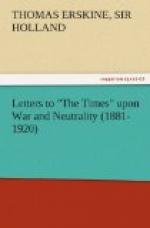The increasing gravity of the conditions in China and the imminence of peril to our own diversified interests in the Empire, as well as to those of all the other treaty governments, were soon appreciated by this Government, causing it profound solicitude. The United States from the earliest days of foreign intercourse with China had followed a policy of peace, omitting no occasions to testify good will, to further the extension of lawful trade, to respect the sovereignty of its Government, and to insure by all legitimate and kindly but earnest means the fullest measure of protection for the lives and property of our law-abiding citizens and for the exercise of their beneficent callings among the Chinese people.
Mindful of this, it was felt to be appropriate that our purposes should be pronounced in favor of such course as would hasten united action of the powers at Peking to promote the administrative reforms so greatly needed for strengthening the Imperial Government and maintaining the integrity of China, in which we believed the whole western world to be alike concerned. To these ends I caused to be addressed to the several powers occupying territory and maintaining spheres of influence in China the circular proposals of 1899, inviting from them declarations of their intentions and views as to the desirability of the adoption of measures insuring the benefits of equality of treatment of all foreign trade throughout China.
With gratifying unanimity the responses coincided in this common policy, enabling me to see in the successful termination of these negotiations proof of the friendly spirit which animates the various powers interested in the untrammeled development of commerce and industry in the Chinese Empire as a source of vast benefit to the whole commercial world.
In this conclusion, which I had the gratification to announce as a completed engagement to the interested powers on March 20, 1900, I hopefully discerned a potential factor for the abatement of the distrust of foreign purposes which for a year past had appeared to inspire the policy of the Imperial Government, and for the effective exertion by it of power and authority to quell the critical antiforeign movement in the northern provinces most immediately influenced by the Manchu sentiment.
Seeking to testify confidence in the willingness and ability of the Imperial administration to redress the wrongs and prevent the evils we suffered and feared, the marine guard, which had been sent to Peking in the autumn of 1899 for the protection of the legation, was withdrawn at the earliest practicable moment, and all pending questions were remitted, as far as we were concerned, to the ordinary resorts of diplomatic intercourse.
The Chinese Government proved, however, unable to check the rising strength of the Boxers and appeared to be a prey to internal dissensions. In the unequal contest the antiforeign influences soon gained the ascendancy under the leadership of Prince Tuan. Organized armies of Boxers, with which the Imperial forces affiliated, held the country between Peking and the coast, penetrated into Manchuria up to the Russian borders, and through their emissaries threatened a like rising throughout northern China.




